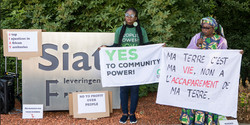AEFJN, CIDSE, CNCD-11.11.11, Entraide et Fraternité, FIAN Belgium, ERA, JVE-CI, YVE | 26 June 2023
SIAT’s silence in the face of demands from affected communities
One year ago, a delegation of communities from several African countries, accompanied by local and Belgian NGOs, denounced the grabbing of their land and the violation of their rights in front of the SIAT-Group headquarters in Brussels. After an initial opening to dialogue, the Belgian company abandoned its commitments. The communities are calling for a resumption of dialogue with a view to resolving the land conflicts and compensating the damage suffered.
Despite SIAT’s initial efforts to re-engage in dialogue, no concrete positive results have been achieved. Only one meeting took place in in Abidjan between the affected communities and the company’s CEO. Despite regular reminders from civil society that SIAT should follow up the conclusions of this meeting, the company put an end to contacts. Similar meetings planned in other countries where SIAT operates (Ghana and Nigeria) have never been confirmed or scheduled.
It should be remembered that the expansion of SIAT’s plantations was carried out without guaranteeing the rights of local communities. Although the contexts are different from one country to another, the testimonies of communities in Ghana, Côte d’Ivoire and Nigeria are similar when it comes to the impacts of the company: land grabbing threatening the food sovereignty of local communities, loss of biodiversity, environmental degradation and strong repression of opposition to the company’s activities by local people.
SIAT is one of the five major companies that alone control 75% of the oil palm plantations in Africa. It sells its palm oil-based products to major multinationals such as Unilever and Nestlé, and its rubber products feed the supply chains of international tyre giants such as Michelin and Goodyear.
The communities are expressing their opposition to a predatory model of agricultural development, which they consider to be inspired by a neo-colonial logic, and are calling for the adoption of binding rules for companies at Belgian, European and international level. Less than a month after the European Parliament voted in favour of the Directive on corporate sustainability due diligence, we call on SIAT’s management to honour its commitments and put an end to these damaging practices.
ADDITIONAL INFORMATION
News article by two journalists, Magdalena Krukowska and Zuza Nazaruk, published in May 2023 by Unbias the News and iWatch Africa. A documentary is currently in production.
CONTACTS
African press:
Rita Uwaka, Friends of the Earth Nigeria, T : +2348034553503 – riouwaka(at)gmail.com
Belgian press:
Francesca Monteverdi, Entraide et Fraternité, T : +32 456152125 – francesca.monteverdi(at)entraide.be
Florence Kroff, FIAN Belgique, T : +32475845624 – florence(at)fian.be
European press:
Giorgio Gotra, CIDSE, T : + 32 2 233 37 52 – gotra(at)cidse.org
Elise Kervyn, CIDSE, T : + 32 477 69 70 18 – kervyn(at)cidse.org












